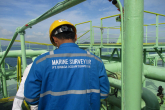Marine Salvage Operator
Key tasks:
• Tow vessels.
• Refloat vessels.
• Undertake emergency repairs of vessels.
• Pump water and keep vessels afloat.
• Extinguish fires.
• Evacuate crew or passengers.
• Recover cargo.
• Remove pollutants.
• Maintain and operate specialised salvage equipment.
Entry requirements/training:
All salvage work is subject to the same licencing and certification requirements as sea going maritime workers as defined by the International Maritime Organisation. Refer to the section on seafarers for more information on this. Depending on what area of salvage you would like to go into, you will need train in that particular aspect. A number of people in the industry started their careers in the navy or merchant shipping.
Due to the wide range of skills needed for salvage work, you can work your way up in the industry taking on more complex work. There is a distance learning Diploma in Marine Salvage Operation offered by the Maritime Training Academy.
Associated job opportunities:
Professionals in the field of marine salvage may find associated job opportunities across various sectors. Here are some potential roles and associated job opportunities related to marine salvage:
• Salvage Project Manager
• Salvage Engineer
• Salvage Master
• Diver/Salvage Diver
• Underwater Welder
• Project Coordinator (Marine)




